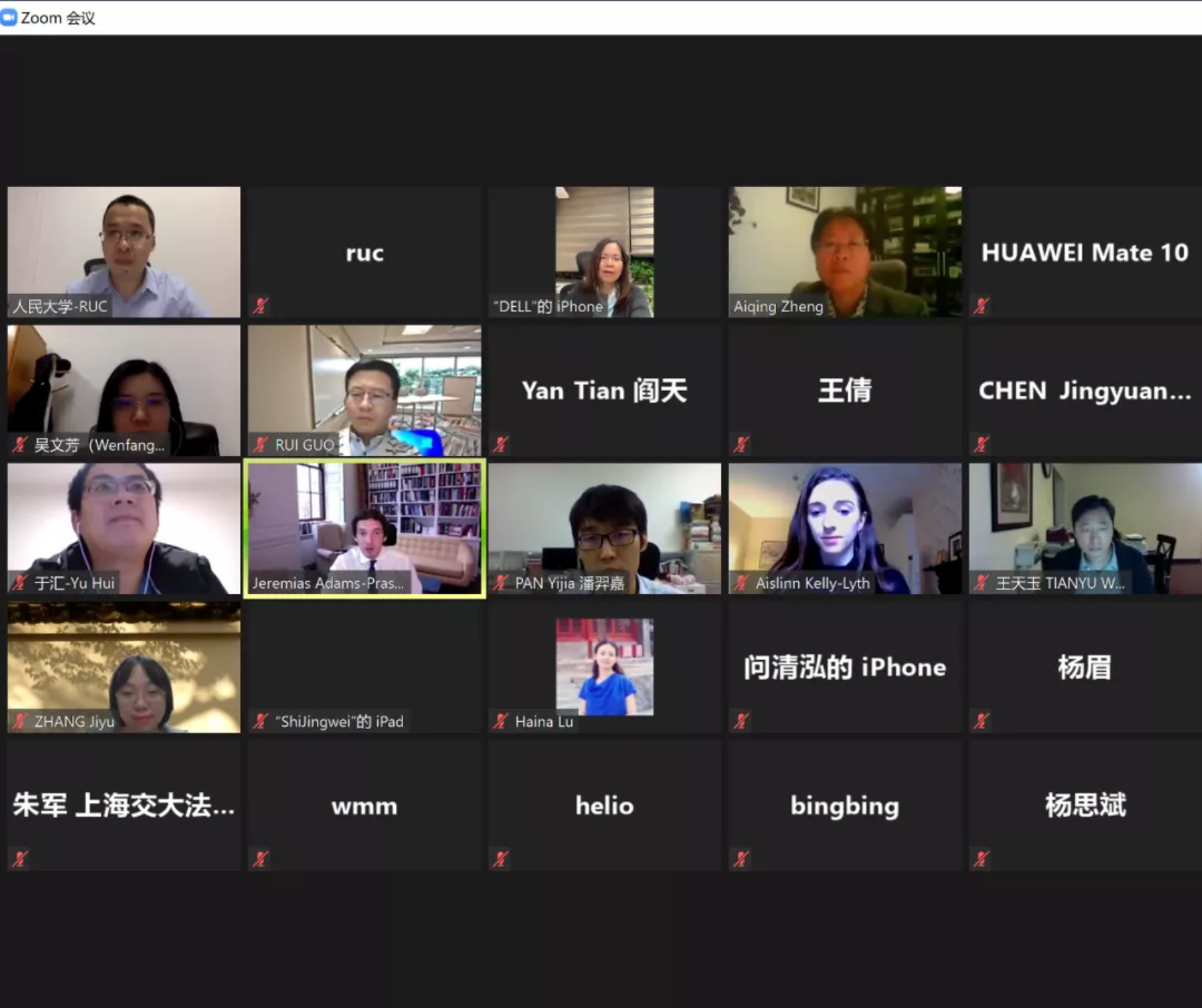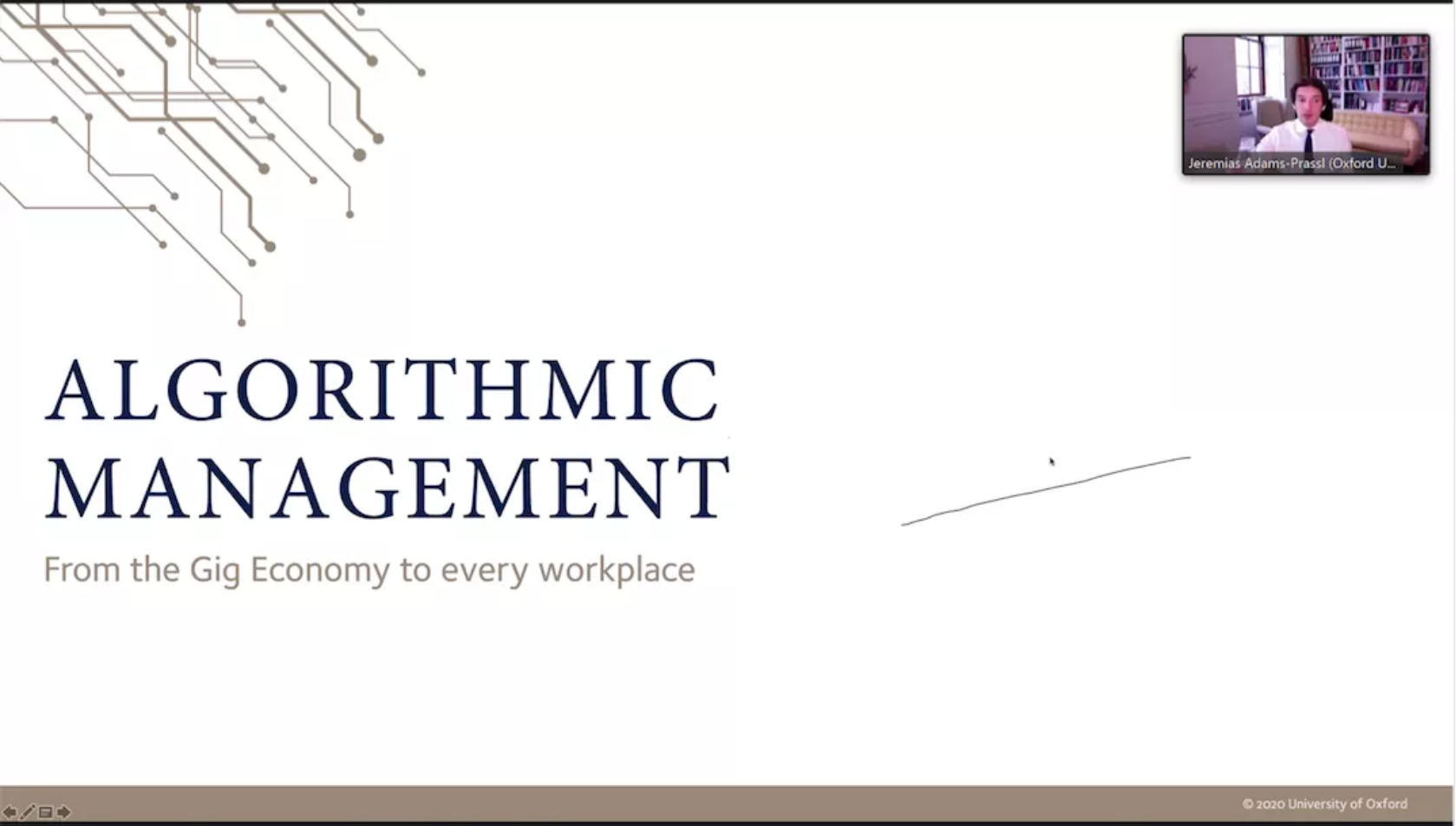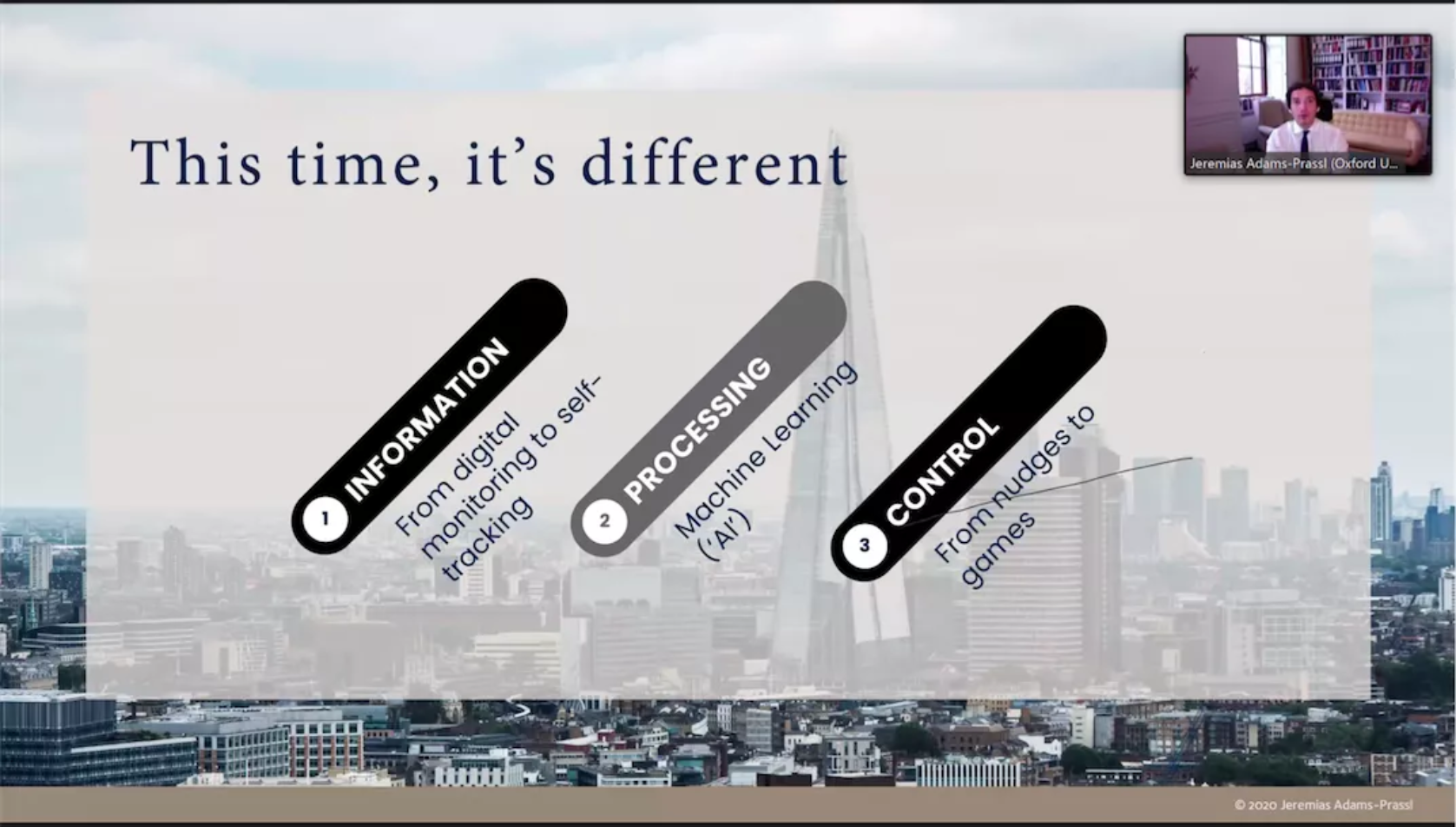Professor Jeremias Adams-Prassl Gave a Lecture on Black Box Boss: Algorithms at Work
time:2021-01-28On the evening of November 11, 2020, "Black Box Boss: Algorithms at Work -- Frontier Forum on the Regulation and Development of 'New Employment Forms'" was successfully held through an online conference hosted by the Social Law Teaching and Research Center of the Law School of Renmin University of China and Law and Technology Institute of Renmin University of China. This is the fourth lecture in the Autumn 2020 Lecture Series to celebrate the 70th Anniversary of the Law School of Renmin University of China.
Professor Jeremias Adams-Prassl from the Law School of the University of Oxford was invited to give a keynote speech. Lin Jia, professor of Renmin University of China Law School, director of the Institute of Labor Law and Social Security Law, and director of the Center for Social Law Teaching and Research, attended the conference as a guest speaker. Zheng Aiqing, Associate Professor of Renmin University of China Law School, Zhang Jiyu, Associate Professor of Renmin University of China Law School, Lu Haina, Associate Professor of Renmin University of China Law School, Guo Rui, Associate Professor of Renmin University of China Law School, Fan Wei, Professor of Capital University of Economics and Business School of Labor Economics, Wu Wenfang, Researcher of the law school of Shanghai University of Finance and Economics, Wang Qian, Associate Professor of Tongji University Law School, Wang Tianyu, Associate Researcher, of Institute of Law of Chinese Academy of Social Sciences, Yan Tian, Assistant Professor of Peking University Law School, Ding Wenwen, lecturer of China University of Political Science and Law School of Civil Business and Economics, Chen Jingyuan, Postdoctoral Fellow of Tsinghua University Law School, Yu Hui, Lecturer of China University of Political Science and Law School of Civil Business and Economics, Pan Yijia, Postdoctoral Fellow of law school of Renmin University of China, Aislinn Kelly-Lyth, Research Associate of University of Oxford Law School attended the webinar. Ding Xiaodong, Associate Professor of Renmin University of China Law School, served as the moderator. The webinar attracted more than 100 teachers, students and colleagues from colleges and universities across the country to attend.
Professor Lin Jia gave a welcome speech before the lecture began. Professor Lin Jia first expressed her heartfelt thanks and warm welcome to Professor Jeremias for accepting the invitation of the webinar, and introduced the relevant information. Professor Lin Jia then argued that the development of data, algorithms and artificial intelligence poses a huge challenge to the existing Labour law system. At the same time, she raised a list of issues, and called on Chinese and foreign scholars to make joint efforts to conduct in-depth discussion and sustained research on relevant issues. Finally, Professor Lin Jia said that she looked forward to more cooperation and exchanges between the Law School of Renmin University of China and the Law School of Oxford University in the future, and wished this forum a successful meeting.

Professor Jeremias startd with the history of research on the impact of artificial intelligence on employment since the 19th century. He believed that the research center of the relationship between artificial intelligence and employment is not substitutive, but complementary, that is, some work tasks done by human individuals will be replaced by algorithms, but this does not mean that artificial intelligence will completely replace human work. He pointed out that AI is not only changing the labor market, but also changing the work scene. What really needs to be thought about is the fundamental impact of AI on the organization and nature of work.
Taking Uber as an example, Professor Jeremias pointd out that although what we see is the continuous improvement of automation in the overall management of workers, he believed that we are actually faced with a series of new challenges. This series of challenges can be divided into three main lines: Information, Process and Control.

After a series of arguments, Professor Jeremias proposed the Control Accountability Paradox. He advocated that we move beyond this technological determinism and really think about how the law can play a key role in meeting the challenges and shaping labor relations, and actually make sure that we get the best possible outcomes in different futures of work. That is, technology itself is not necessarily the only challenge from a normative perspective. Our challenge is to find new ways to create legal safeguards for the positive use of technology to avoid some of the dangers identified above.

Associate Prof. Zheng Aiqing, from the Law School of Renmin University of China, said that the future of labor should still be people-centered rather than technology-centered. She pointed out that China is in the initial stage of being hit by the new technological revolution, and that our country still lacks a series of targeted laws and regulations. The Civil Code provides a foundation for protecting personality rights and data-based rights. She pointed out that in the digital age, to examine the gaps in existing laws, new rights for new types of employees should also be considered legally. In addition, Zheng Aiqing talked about the impact of the technological revolution on employee associations and alliances. In this area, she believed, the government should introduce more regulations to ensure the stability of trade unions, safeguard the rights of employees to form associations, give play to the role of trade unions and promote collective dialogue.
Associate Prof. Zhang Jiyu, from the Law School of Renmin University of China, first talked about the huge potential of information technology to change the relationship between copyright owners, platforms and users. She stressed the importance of algorithms for platforms in the information age. At the same time, she asked whether the platform should give users certain rights to better understand the technology under the current technological background, and whether it should provide a panel of experts or public jurors to check whether users have infringed. Faced with the monitoring of algorithm technology, she said that when the market plays an important role in the regulation of algorithms, we should timely review the causes of market failure, and formulate appropriate laws and regulations while making reasonable use of technology, so as to improve algorithms and work.
Associate Prof. Lu Haina, from the Law School of Renmin University of China, said there has been a lot of discussion in China about the legal response to the gig economy, but in the field of labor law, the existing labor law framework needs to be adjusted to protect platform practitioners. From the perspective of human rights law, Associate Prof. Lu Haina focused on the right to work and studies the impact of artificial intelligence on the right to work, discussing whether the concept of the right to work should be updated, the value of work should be reviewed, and the normative content of the right to work should be adjusted as well as the corresponding national obligations.
Associate Prof. Guo Rui, from the Law School of Renmin University of China, recommends Watching Capitalism, a book by Shawshana Jubof, a professor of Harvard Business School, as a comparison. This book describes a new mode of production. Professor Jeremias analyzes the impact of new technologies such as algorithms and artificial intelligence on the world of labor from the perspective of political economy, which is also very fresh.
Professor Fan Wei, School of Labor Economics of Capital University of Economics and Business, said, first, algorithms are widely used in the field of work, especially in major platforms. Platforms set different requirements for different types of employees by using algorithms, which makes employees on the same platform complete their work in an unfair way, resulting in the segmentation of the labor market. Second, how to view the relationship between platform and AI system, platform and workers. Depending on how we look at an AI system, we think of it as a separate factor of production, a tool for employers, or something else. In the future, perhaps we will have to go back to the drawing board and analyze jobs in terms of the relationship between employer and employee.
According to Researcher Wu Wenfang, from the law school of Shanghai University of Finance and Economics, first, we should have a positive attitude towards the widespread use of AI in the workplace. Second, the law should consider how to use the advantages of artificial intelligence and reduce its disadvantages. Third, only by learning the basic knowledge of algorithms can we better understand how to regulate technology by law. The protection of personal information needs to be strengthened to prevent data abuse. Strengthen interdisciplinary research between different disciplines to better cope with the new challenges AI brings to employment.
Associate Prof. Wang Qian,from Tongji University Law School, proposed, first, employers use big data and artificial intelligence systems to set up a model for sifting through resumes. The employer incorporated criteria he considered important into the model, such as ambition or a happy marriage. Is this a good choice or is it illegal? Second, GDPR puts forward high requirements for data protection, which may hinder the development of emerging industries in the labor market. What should we think of this legislation?
Associate Researcher Wang Tianyu, from the Institute of Law at the Chinese Academy of Social Sciences, mentioned that the development of the platform has a positive impact on job creation. He pointed out that Marx's Das Kapital, Book I, Chapter 13, talks about the effects of the industrial revolution on workers. In it, the topic mentions the struggle between the worker and the machine. We may as well from the historical point of view to observe the impact of each labor technology progress on workers. The algorithm certainly has its new features, but are they all new? History may offer some clues that changes in work intensity and status are not necessarily new or disruptive.
Associate Prof. Yan Tian, from Peking University Law School, pointed out that nowadays, employees are often loyal to more than one employer, and sometimes many employers try to manage one employee at the same time, making it difficult to find a one-on-one employment relationship. Another challenge in identifying an employer today is what we call a black box employer. Today, algorithms are challenging labor relations and labor laws, opening a new chapter in the long battle between liberals and employers. Associate Prof. Yan Tian proposed that the development of the employment law shows that we expect employers to only think about good things, and they should not think about any discriminatory action or anything that might be harmful to employees.
Lecturer Ding Wenwen, from the School of Civil Business and Economics at China University of Political Science and Law, believed that we don't need to worry too much about automation causing mass unemployment, as it will also create many jobs. And many aspects of the modern Labour market may not actually be automated. She expressed reservations about creating a new normative system to solve the algorithm's problems. She thought revising and improving the current system might be a better way forward. In addition, it remains doubtful whether algorithmic management will be popularized on a large scale in a developing country like China in the near future.
Technology itself is neutral, said Postdoctoral Fellow Chen Jingyuan of Tsinghua University's law school. In the face of the rise of algorithmic management, we cannot simply say whether technology is good or bad. The real challenge is how to use it to shape the jobs of the future, while ensuring that workers still enjoy decent and sustainable working conditions. This is all the more important at a time when prevention and control of the epidemic is becoming routine. Platform-based employment mode has large employment capacity, low entry threshold and strong flexibility. However, it must be admitted that such flexible practitioners receive less legal protection and policy support than standard employees. The outbreak could be a catalyst for further improvement of legal protection for platform practitioners.
Lecturer Yu Hui, from the Law School of Civil Business and Economics of China University of Political Science and Law, first took the outsourcing platform as an example to introduce its basic operation mode.Where these platforms draw the line from traditional employers is a question to ponder. Of greater concern are the subtle controls that algorithms exert. He thinks it's an issue to think about where these platforms are drawn from traditional employers. Of greater concern are the subtle controls that algorithms exert.
Postdoctoral Fellow Pan Yijia, from Law School of Renmin University of China, raised the possibility of applying the principle of strict liability. The current legal system provides inadequate protection against discrimination of any kind. Strict liability was created about a century ago to protect the public from harm caused by advancing technology. In turn, can we address discrimination caused by artificial intelligence in a similar way to strict liability?
At the end of the webinar, Prof. Jeremias responded to the comments and questions of the speakers from the aspects of the debate between the old and new labor market regulations, the application of strict liability and the advantages and disadvantages of algorithmic technology. Associate Prof. Ding Xiaodong, from Renmin University of China Law School, once again thanked Prof. Jeremias for his wonderful lecture. He said that the topic of this lecture combines data protection with labor laws and regulations, and that some scholars are currently discussing employment law as trust law. It will be interesting to see the combination of these fields and other fields, such as anti-discrimination. Associate Prof. Ding thanked Prof. Jeremias and Prof. Lin Jia for their presence, as well as the speakers and the audience. This webinar was successfully ended with the thanks and applause from the participants and the audience.

